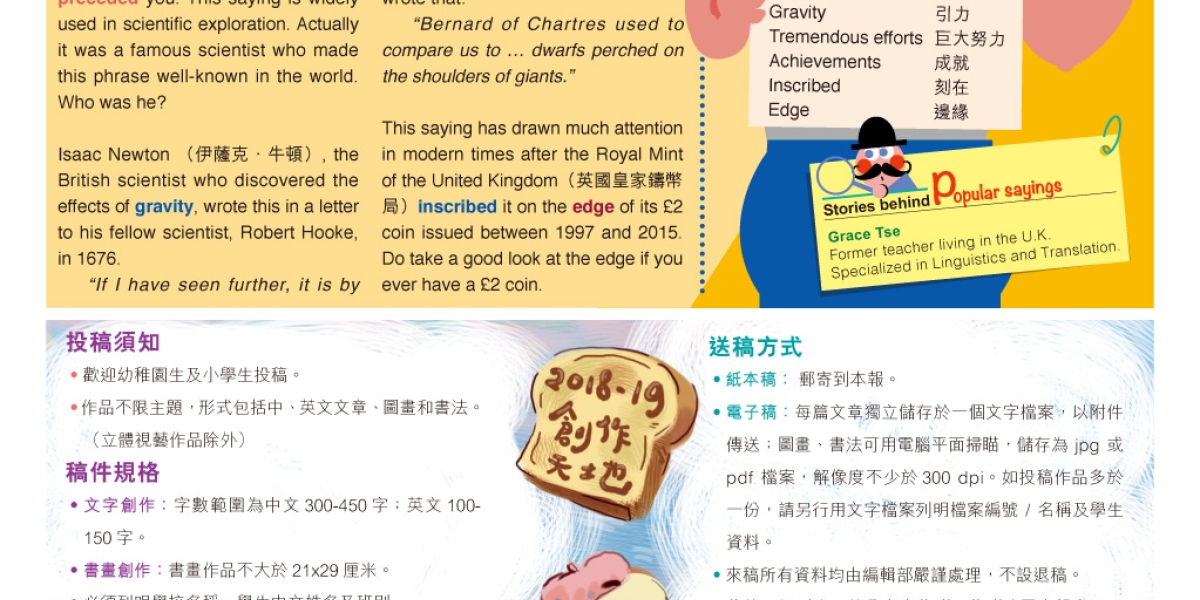昔日文章


Stories Behind Popular Sayings
2018.09.14
Standing on the shoulders of giants
After a long summer holiday, your classmates and you have gone back to school. Despite the easy access to information via the internet nowadays, it is still important to attend school in order to receive an all-round education. A good school education can enable you to see new horizons by standing on the shoulders of giants.
The saying “standing on the shoulders of giants” means that you can make rapid progress from the success and failure of the great thinkers who have preceded you. This saying is widely used in scientific exploration. Actually it was a famous scientist who made this phrase well-known in the world. Who was he?
Isaac Newton (伊薩克.牛頓), the British scientist who discovered the effects of gravity, wrote this in a letter to his fellow scientist, Robert Hooke, in 1676.
“If I have seen further, it is by standing upon the shoulders of giants.”
「如果我看得更遠,是因為我站在巨人的肩上。」
Newton felt that without building on the tremendous efforts made by other scientists, he could not have made further achievements in scientific discoveries.
Some scholars believe that this saying started as early as the 12th century. In his book “Metalogicon”, John of Salisbury, an English bishop, wrote that:
“Bernard of Chartres used to compare us to … dwarfs perched on the shoulders of giants.”
This saying has drawn much attention in modern times after the Royal Mint of the United Kingdom(英國皇家鑄幣局)inscribed it on the edge of its £2 coin issued between 1997 and 2015. Do take a good look at the edge if you ever have a £2 coin.
Glossary
Horizons
眼界
Progress
進步
Preceded
居先於
Gravity
引力
Tremendous efforts
巨大努力
Achievements
成就
Inscribed
刻在
Edge
邊緣


If you were...
2018.06.08
What would you do if you were Roselle ?
Last Monday was a confusing day for Roselle. During lunch time, she watched a debate led by the Student Council(學生會)at school. Even though the school seldom talks about political matters, the proposition (命題)of that day was “Should the Tiananmen Square protests be commemorated?”(應否悼念六四)This topic of course was not chosen by the school, but the school prefects have all the right to select those that are of interest to them. The Affirmative side(正方)tried their best to advocate (擁護)and uphold(支持)the resolution(決議). The Opposition(反方)also fiercely opposed(反對)and refuted(駁斥). All the points both sides mentioned made a lot of sense(合理). So happened that day was 4th June. She went home and brought the matter up during dinner to her grandparents and parents. The two generations each had very different thoughts, and they ended up arguing for the whole night. Roselle felt so bad and blamed herself for not having her own standpoint(立場).
What would you do if you were Roselle ?
I would tell the four auguring adults at home to form(組織)a debate team and have their points organized(組織), then set another day for a real debate at home. They should invite more relatives to join in or to observe. It would be quite a scene.
There is absolutely no right and wrong in politics. If I were interested in any political topics, I must collect enough information from every party(當事人) involved, so as to stay unbiased(無偏見). I should not have any stance(立場)before being in everyone’s shoes (站在各人立場想一想). I’d also politely thank the arguing adults at home for sharing their thoughts and put a stop to the fight. Everyone has the right to think differently, and there is no need to convince(說服)anyone.


If you were...
2018.06.01
What would you do if you were Ethan?
It’s still a long way before the summer vacation, Ethan is anxiously(焦急地)waiting for the school to announce(宣布)the dates for the summer retreat camp. This is a 3-day camp which usually takes place in Cheung Chau for all Catholic students, an optional(非強制性)activity. Ethan participated(參加)for the past two years and he finds it most rewarding(值得). On one hand, he can make new friends with schoolmates of different forms(年級), on the other, he enjoys the religious teaching by a very humorous(幽默)priest. Yet, Ethan’s mother is focusing(注意力集中於)more on what tutorial classes(補習班) and other recreation activities(娛樂活動)to register for Ethan. She is now thinking of sending Ethan to an expensive UK study tour(遊學團). Ethan worries so much that time may clash(相撞)with the Catholic students retreat camp. He is most agitated (不安). He is afraid that telling about his different priorities(優次)may upset her.
What would you do if you were Ethan?
Since I haven’t any information about the dates for retreat, I’d wait until announcement comes out and see if it would clash with anything. I’d stay silent and it would not be my fault if my mother spent much effort in collecting information for other activities that I could not attend, I never asked her to.
I’d disclose(透露)to her about my wish of attending the retreat and gauge(評估)her expectation. In case the dates really clashed, then we would further discuss options, and I’d try my best to convince her at that stage(這階段). I’d speak out as soon as possible.


Stories behind famous saysings
2018.04.14
Chinese whispers
You might have played a simple but fun game with your classmates. In this game, all players form a circle or a straight line. The teacher whispers a message, which can be a sentence or two, in the ear of the first player. Then he or she passes the message quietly to the second player, who in turn whispers to the next one. The last player speaks out the message loudly. At this point, all of you may be amused that the message has become so “inaccurate” that it is completely different from the original one.
While this game is called “telephone” in the USA, British people call it “Chinese whispers”. Before the mid-1900s, the game was called “Russian scandal” in British English. There is no clear reason for the change of the name.
The children’s game of “Chinese whispers” can be used idiomatically to describe any information which is distorted when it is passed by word of mouth among many people. This idiomatic meaning is often used in news stories.
The manager described the plans to rebuild the shopping mall as Chinese whispers(以訛傳訛;道聽塗說).
Some people argue that this idiom may sound offensive because it implies that Chinese people like to talk about silly things. However, scholars think that the phrase was created probably because British people find it difficult to understand the Chinese language.
If you want to avoid any negative implications of this idiom, what synonyms can you use instead? “Rumour” and “hearsay” may be some good options.
p.p1 {margin: 0.0px 0.0px 0.0px 0.0px; font: 12.0px Helvetica; min-height: 14.0px}
p.p2 {margin: 0.0px 0.0px 0.0px 0.0px; text-align: justify; line-height: 12.1px; font: 11.0px Helvetica; color: #2d2829}
p.p3 {margin: 0.0px 0.0px 0.0px 0.0px; text-align: justify; line-height: 12.1px; font: 11.0px MHeiHK; color: #2d2829}
span.s1 {font: 12.0px Helvetica; color: #000000}
table.t1 {border-collapse: collapse}
td.td1 {padding: 0.0px 5.0px 0.0px 5.0px}
Glossary
Whispers
耳語
Amused
感到好笑
Scandal
醜聞
Distorted
被歪曲
Word of mouth
眾口相傳
Offensive
得罪他人
Implications
含意
Synonyms
同義詞


